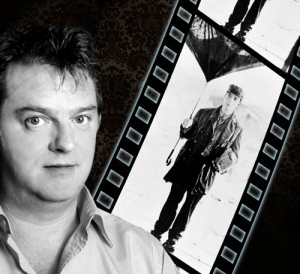An Interview with Paul Merton

By Matt Callard
There’s one major difference between the Paul Merton who sits far right all deadpan and detached on Have I Got News For You, who dishes out laser-guided barbs to the pompous and the pretentious, who pummels stale predictability with inspired verbal journeys into the absurd and the surreal, and the Paul Merton that chats amiably and extensively to On: Yorkshire Magazine about his passions and his profession: and that thing, ironically, is laughter.
Paul laughs at anything and everything. He laughs at his own jokes, he laughs at his anecdotes, he even, incredibly and not unkindly, laughs at the interviewer’s tepid attempts at a bit of humorous toe-dipping. It feels good that he laughs at you, but it’s a little like Mike Tyson giving you a nice little pat on the head after you’ve tried to land your fiercest uppercut. ‘Nice try, son, but please proceed onward from here with caution’.
Have I Got News For You begins its 19th year on our screens in April which means, naturally, that the programme is now a fully-fledged National Institution. And, natch, Paul Merton is its National Treasure. Suitably, Paul puts the show’s durability into a political context.
“It’s hard to believe it but, when it first started, Margaret Thatcher was Prime Minister. But only for about five weeks. Clearly she couldn’t take the pressure of a weekly satirical show on BBC2.” Merton took a break from the show in 1996 but has been an ever-present since. His absence did undeniably give the show the shot in the arm it needed. “The key to keeping it fresh,” he says, “is to look at it in a fresh way all the time. So I don’t start looking at it like ‘oh I’m doing this again’ – that’d be awful.”
 “Part of the team”
“Part of the team”
Course, Merton started out in stand-up, as a crucial part of the burgeoning alternative comedy scene of the early to mid-eighties. One early routine of his about an acid trip has become the stuff of stand-up comedy legend. But improv is his real love. He’s a regular contributor to Radio 4’s Just a Minute and performs most Sundays with the Comedy Store Players.
“I’ve been doing the improv shows since 1985. I enjoy doing that every week. It sort of keeps you match fit.” Paul also confesses to liking the camaraderie and teamwork of the improv scene over the sometimes brutal lone riffing of the stand-up. “Being a solo stand up is a totally different experience from four or five people improvising a show together on stage for two hours. Improv is very social. Everybody in the dressing room is part of the team, there are no rivals. There’s nobody thinking ‘God I hope he does badly tonight’ – which you can get in a dressing room full of comics because it’s a tough business.”
Primarily though, Paul’s here to talk about his other great love and passion – silent cinema comedy. When I point out that certain fellow-alternative comedians have been somewhat less than praiseworthy of the era, Merton characteristically pounces. “Oh yes, Blackadder. I think there was something about the tired semantics of Charlie Chaplin or something. This coming out of the mouth of Mr. Bean was really something!” It’s the kind of no-come-back, ball’s-in-the-back-of-the-net, unerringly-accurate-verbal-missile that is his stock-in-trade.
He takes his Silent Clowns tour on the road in April. It’s a similar format to a previous tour that featured vintage clips, facts, chat and laughs in the first part, then a full-length feature (from Harold Lloyd) in the second, all accompanied by a live pianist. “This time we’re showing Steamboat Bill Jr in the second half.” says Paul. “Even people who don’t know about silent comedy, they might be familiar with the house falling around Buster Keaton. This is the film with that in. That sequence, which probably only lasts for about ten seconds, is part of this whole 15 minute sequence which takes part in a cyclone. It’s only a small bit – like hearing the first part of Beethoven’s Fifth.”
“You can just see the shirt ruffle”
It’s a joy to sit with him and listen to him enthuse about his heroes. He’s clearly an authority – his admiration approaches awe at times. “In terms of that shot with the building falling over, that was a seriously risky thing that Buster Keaton was doing there. Firstly the set weighs about three and a half tons and he doesn’t want it to warp because he’s got wind machines blowing this thing over and he’s got an inch clearance from the top of his head and across each shoulder.
“The co-director on the film was so horrified that he was going to do this that he refused to attend the set. He was actually in a nearby hotel praying with a Christian Scientist. If you look at the film, you can just see the shirt ruffle a bit as the set falls around him.” One thing’s certain – you’d never get Jim Carrey trying that.
 I suggest it is perhaps something of a missed opportunity, when TV execs are crying out for decent family entertainment with a bit of slapstick thrown in (Hole In The Wall? Total Wipeout? Pah!), that you have to do some serious scouring of the schedules to find a bit of classic Chaplin, Laurel & Hardy or Harold Lloyd. “I don’t really know why that is,” confesses Paul. “I suppose when I first got heavily into silent comedy there was a programme by Michael Bentine and it was shown on BBC1 on a Friday night at eight o’clock, I think. The idea now that you can show something on a Friday night that’s full of black and white images and no sound – people would say what the hell is this? I don’t pay my license fee to have no sound!”
I suggest it is perhaps something of a missed opportunity, when TV execs are crying out for decent family entertainment with a bit of slapstick thrown in (Hole In The Wall? Total Wipeout? Pah!), that you have to do some serious scouring of the schedules to find a bit of classic Chaplin, Laurel & Hardy or Harold Lloyd. “I don’t really know why that is,” confesses Paul. “I suppose when I first got heavily into silent comedy there was a programme by Michael Bentine and it was shown on BBC1 on a Friday night at eight o’clock, I think. The idea now that you can show something on a Friday night that’s full of black and white images and no sound – people would say what the hell is this? I don’t pay my license fee to have no sound!”
“Universal cinema”
Add to this the ageless appeal of silent comedy – not just in the eternal thrill of physical tomfoolery but in that it genuinely appeals across all age groups. “This year I was showing a Harold Lloyd film and there were a couple of kids attending who were about three and I was thinking ‘that’s probably a bit young, would they sit through an hour long film?’ But they loved it! They just loved to see adults falling over! Kids find that immensely funny because it’s upsetting the natural order of things. Adults are the ones in charge, adults are the ones who tell you what to do and feed you and all that sort of stuff, so when they fall over it’s hilarious.”
It’s a form of universal cinema we’ll never see again – ageless indeed, but borderless also. All you had to do was change the titles to Russian or Chinese or Hindi and the films could be shown anywhere. It was an art form that, Paul explains, made Charlie Chaplin the most famous man in the world. “Everyone knew who he was. When he arrived at Waterloo station in 1921 he was met by tens of thousands of people. We think people like David Beckham are famous but he’s not famous all around the world. These people created, within this art form, a universal cinema that everybody could enjoy.”
For most people, it’s hard to imagine a less cosy location than Paul Merton’s comfort zone – the razor-edge unpredictability of an improv stage. So it’s been interesting to watch Paul away from his – as the slightly reluctant traveller in his Channel 5 travelogues. First in China, then through India, and a couple of unforgettable days out – one at a temple of rats and another with a bruising cabal of hermaphrodite extortionists. He’s about to hit the road again, along the slightly more familiar pathways of western Europe.
Paul can’t quite become the easy-going everyman that Michael Palin so effortlessly – and brilliantly – manages. But it’s to his credit. Part of the joy of watching these programmes is the empathy you feel for him in these awful/wonderful other-worlds. Sweating through his English boater, part enthralled, part bewildered, part loving it, part wishing he was at home with a decent cup of tea instead. Part of you thinks, ‘Well, that’s what I’d be like.’ “Given the choice of being at home or somewhere else – usually I’d rather be at home. I think that’s part of what you see in the travelogues, I think.”
And then he laughs again – bellows, in fact. It’s almost inappropriate, but what else can a man do when a master of comedy laughs, but laugh along too.









